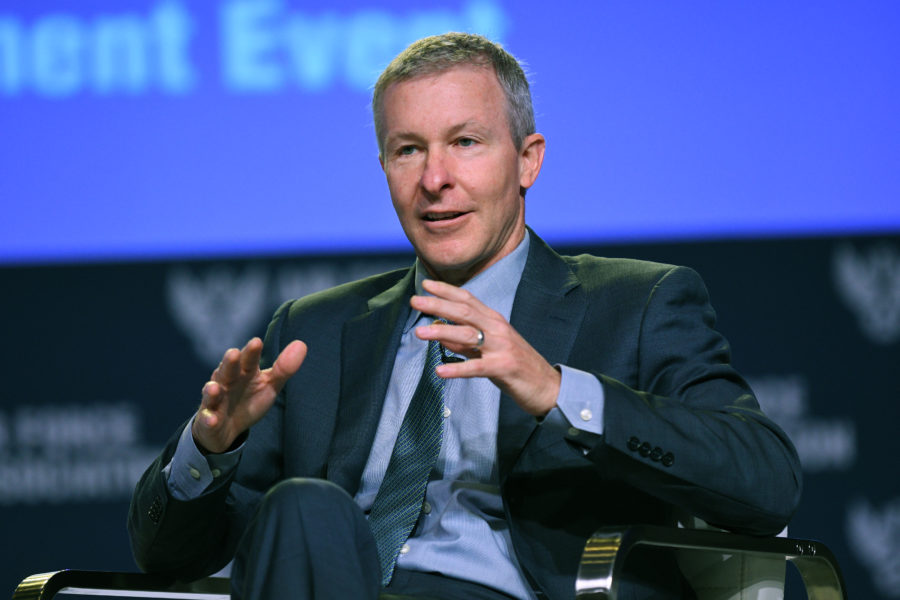As an Air Force Academy cadet in the late 1980s, future United Airlines CEO Scott Kirby became aware he would never fly for the Air Force when he was asked by an instructor to close his eyes and fly straight and level in an F-4 over the Gulf of Mexico.
“When I closed my eyes and flew straight and level, I was at a 30-degree left bank,” Kirby recalled in his keynote address at the Air Force Association’s Air, Space & Cyber Conference in National Harbor, Md.
“And then he said, ‘Now open your eyes and turn it back to flat, and so I felt like it was a 30-degree right bank,” he said. “He laughed at me and said, ‘Well, you’re never gonna be a fighter pilot.’ I’m like, ‘I’m sure he’s right.’”
Kirby went on to work at the Pentagon instead and then entered the aviation industry, reaching the positions of president of US Airways, American Airlines, and United before ascending to United CEO job in May 2020.
Now, he is highlighting the advantage veterans bring to United management, as long as they can make the transition from military hierarchy to private sector independence.
“You’ve got to make the transition successfully,” he said. “With that history and that background, if you can do it, it gives you a leg up on everyone.”
Kirby pointed to United’s Hawaii general manager Ernie Young, who served four tours in Iraq and Afghanistan and was named to oversee the United Airlines flights that helped carry Afghan refugees to the U.S. from Ramstein Air Base in Germany.
“That military background, what he has, what Ernie has, is something that no one in the civilian world could ever have,” Kirby said. “He’s a rock star who has the ability to do more than anyone who doesn’t have that experience.”
Kirby said veterans must be able to leverage their leadership and management skills culled from a career in the military, but also to be creative in a private, meritocracy-type environment.
“There’s a transition from the military, which is very hierarchical and by-the-book, to something that is not hierarchical, that encourages a little bit more individuality and willingness to kind of break the rules,” he said.
It’s the kind of innovation he is now brining to United, which aims to be the first commercial airline to re-introduce transcontinental supersonic passenger flights by 2029, ordering 15 aircraft.
During COVID-19, Kirby also encouraged United to be the first airline to impose a mask mandate and the first to require vaccines, and he partnered with the Defense Advanced Research Projects Agency on a study to prove that airline filtration systems prevent the spread of the virus.
Kirby said his airline keeps auxiliary power units running so that airflow is continuous before passengers board and after they de-plane to assure the cleanest air.
“If you stand for something, people will run through walls for you,” he said about the controversial steps.
Kirby’s football analogies did not end with air filtration. With a hunch that a global pandemic would hamper the industry into 2022, the United team prepared for the worst and did not ground or retire aircraft when Delta and American retired hundreds of aircraft.
“We’ve got this opportunity now,” he recalled thinking. “They’re all shrinking. They’ve created an opening on the field that we’re going to run through, and so we ordered 500 airplanes in the next few years.”
The bet, Kirby said, is that international and business travel will rebound.
That innovation does not go as far as unmanned aircraft, nuclear-powered aviation, or suborbital rockets, such as the recent Virgin Galactic and Blue Origin efforts offering space forays for the super-rich.
Kirby said unmanned aircraft still face a cyber threat and that rocket propulsion is far too costly with a huge environmental impact. The executive prefers to invest in development of electric airplanes.
Asked by AFA executive vice president, retired Maj. Gen. Douglas L. Raaberg, what he learned at the Air Force Academy that has colored his thinking and leadership style, Kirby reflected for a moment.
“I loved my time there—well, especially the further away from it I was,” he said to laughs from an auditorium filled with uniformed Airmen and Guardians. “I realized that I learned a lot. I learned discipline. I learned do the right thing. I learned, ‘No excuses, sir.’”
